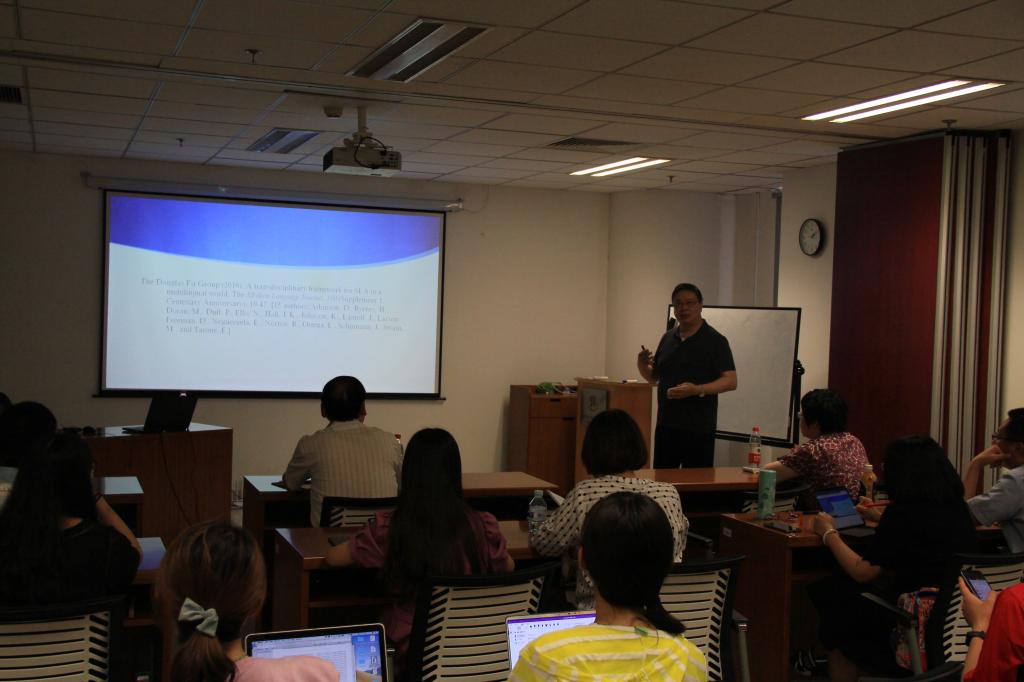
Have you heard of the "Critical Period of language"? Is second language learning the sooner we start the better? Have you already passed the critical period? If you have missed it, would you still have the opportunity to learn an authentic second language? In this lecture, Professor Ke will answer many questions in our mind and provide solutions for you who are experiencing anxiety!
Introduction
On the afternoon of June 13, 2019, the third lecture of the Second Language Series, which was titled "Age effects on second language learning" under the sponsorship of the Center for Cognition Science of language, BLCU, was successfully held.
In this lecture, Professor. Ke mainly introduced the age effect in the study of second language acquisition, and explored issues that are of great concern to everyone, namely, “critical period of language learning”, “verbal perception and second language acquisition”, and “who is better in second language learning, children or adults?" Then let's take a look back at Professor Ke's wonderful lecture together.
Lecture knowledge
(1) The Critical Period Hypothesis
Professor Ke first explained Chomsky's universal grammar theory (UG). Then he introduced the Critical Period Hypothesis (CPH), which is a period of time when humans learn language. This particular period has a huge advantage in L2 learning compared to other periods. Professor Ke introduced us to the traditional view of CPH. According to experimental results, the decline in foreign language ability of adults may be due to psychological reasons, not physiological reasons.
So what is the reason for the gradual loss of learning ability during the critical period?
Researchers put forward different perspectives:
1. The loss of plasticity is reinterpreted as the loss of universal grammar.
2. The maturity of general cognition and processing ability may be a disadvantage in language learning.
3. Use it then lose it: This view holds that after childhood, the unwanted neural pathways and the language learning abilities it relies on are “dismantled” because it is uneconomical to retain it, and the cost of maintaining it is high.
4. Use it or lose it: This view holds that as time goes by, language ability shrinks because of a lack of use.
(2) Speech perception and second language acquisition
Infants can initially distinguish almost all pairs of phonetic contrasts in the world's language, and then adjust to be sensitive only to the voice pairs that exist in their native language as language experience increases.
(3) Who is the better L2 learner, children or adults?
When L2 learning occurs in the target language environment, adults are initially better than children, but children will catch up in about a year. Younger children are better at learning language implicitly from the surrounding input than adolescents and adults. If you want your child to learn a second language well, it is best to take the child to the target country during the critical period.
On the other hand, when L2 learning occurs in a foreign language learning environment, an earlier start does not bring any speed advantage. We must admit that children have an advantage in acquiring a second language. Is the adult fully defeated in L2 learning? That's not necessarily true. Teenagers and adults are usually better at exams than younger children, and are better able to handle complex language tests and coaching, which is helpful when comparing language studies for children and adults. In addition, adolescents and adults are better than young children in learning about L2 in terms of self-regulation, investment skills and strategies.
So, if you have missed the critical period, don't cry, remember that you can also work with diligence to make for it.
In the natural process of language learning, there is indeed a “critical period” in which language is easier to learn, and almost everyone can acquire their native language during critical periods. However, because of the lack of language environment and sufficient foreign language input, few people can use this convenience to master one or more foreign languages during the critical period. We don't have to feel sorry for this. In any era, language is always a bridge of communication. We should take language learning as a lifelong career, so even if we miss a window with a deadline, we can always choose the door to diligence.
This review ends here, if you have any question, welcome to ask us in the background, we will see you next time!